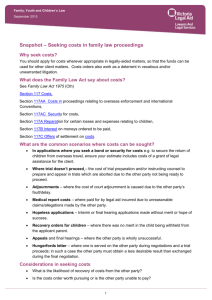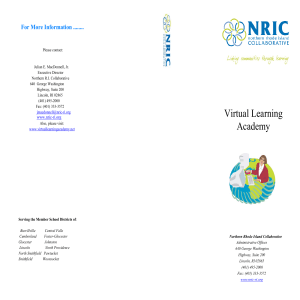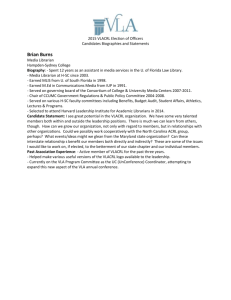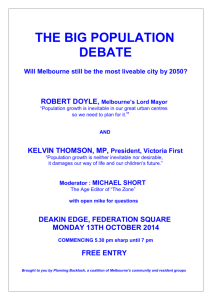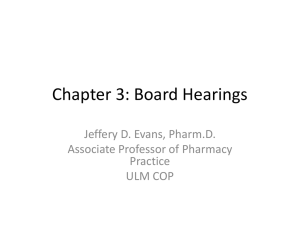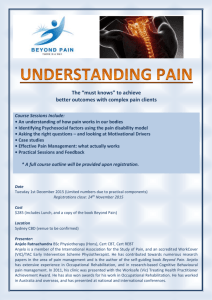Submission DR332 - Victoria Legal Aid
advertisement
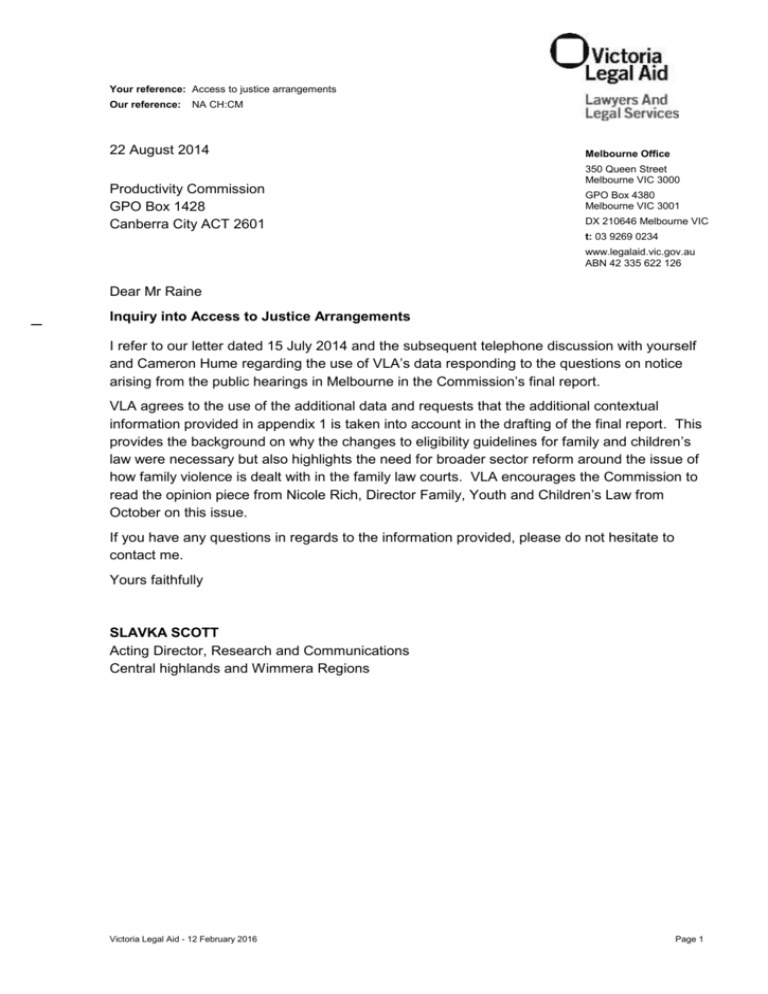
Your reference: Access to justice arrangements Our reference: NA CH:CM 22 August 2014 Productivity Commission GPO Box 1428 Canberra City ACT 2601 Melbourne Office 350 Queen Street Melbourne VIC 3000 GPO Box 4380 Melbourne VIC 3001 DX 210646 Melbourne VIC t: 03 9269 0234 www.legalaid.vic.gov.au ABN 42 335 622 126 Dear Mr Raine Inquiry into Access to Justice Arrangements I refer to our letter dated 15 July 2014 and the subsequent telephone discussion with yourself and Cameron Hume regarding the use of VLA’s data responding to the questions on notice arising from the public hearings in Melbourne in the Commission’s final report. VLA agrees to the use of the additional data and requests that the additional contextual information provided in appendix 1 is taken into account in the drafting of the final report. This provides the background on why the changes to eligibility guidelines for family and children’s law were necessary but also highlights the need for broader sector reform around the issue of how family violence is dealt with in the family law courts. VLA encourages the Commission to read the opinion piece from Nicole Rich, Director Family, Youth and Children’s Law from October on this issue. If you have any questions in regards to the information provided, please do not hesitate to contact me. Yours faithfully SLAVKA SCOTT Acting Director, Research and Communications Central highlands and Wimmera Regions Victoria Legal Aid - 12 February 2016 Page 1 Appendix 1 Court ordered representation - family violence intervention orders Family violence intervention orders – court ordered representation File Count Party role 2008/09 from 8.12.2008 2009/10 2010/11 2011/12 2012/13 2013/14 Total Appellant 0 0 0 2 2 6 10 Applicant 89 293 394 453 445 572 2246 Other 0 0 1 0 0 0 1 Respondent 129 319 458 503 487 568 2464 Total 217 605 848 952 932 1146 4700 Section 71 of the Family Violence Protection Act 2008 (the FV Act) provides that if a respondent does not obtain legal representation for the cross-examination of a protected witness (an applicant) after being given reasonable opportunity to do so, the court must order VLA to offer representation for that purpose. Section 72 of the FV Act provides the court must order legal representation for a protected witness (an applicant) for the purpose of cross-examination by the respondent’s legal representative, unless the protected witness objects to the provision of legal representation. These figures are not a result of VLA refusing to provide grants of legal assistance for these matters. They simply reflect the way Victorian laws have been structured to ensure that the alleged perpetrator of family violence is not permitted to directly cross examine the protected witness (applicant) for a family violence intervention order. Refusals of legal aid funding for family law final hearings Prior to the changes in funding of family law parenting disputes implemented in January 2013, parents who could not settle their disputes in relation to their child(ren) were granted assistance for representation at the final hearing provided they continued to meet eligibility requirements, including the Commonwealth merits tests. When determining whether there was merit to grant assistance for a final hearing other factors taken into consideration included the family report ordered by the court and the views of an Independent Children’s Lawyer. Assistance was not granted for those matters where it was considered the dispute should be resolved through further negotiation, not through a final hearing. 2 Refusals for family law final hearing File count 18/01/11 to 01/07/13 07/01/13 to 31/10/13 Post 01/11/13 Total Total 350 444 325 1082 Average refusal per day 0.49 1.49 1.30 N/A Broadly, the data illustrates a predictable increase in refusal rates following the restriction of the funding guideline on 7 January 2013, with a modest decrease in refusal rates following the relaxation of the guideline in November last year. It should be noted however, that other factors can also reflect refusal rates – for example, lawyers advising clients that they will not be eligible for funding for a final hearing, in which case a request for funding is often not submitted and/or arrangements are made out of court. Context behind changes to funding of family law parenting disputes In the face of record demand and without an increase in government funding and very little indexation of funding for population growth and inflation, the VLA Board had to make considered decisions about who was prioritised for legal assistance. In having to balance difficult choices about funding in the Commonwealth family law, the changes to the family law guidelines reflected: prioritisation of funding for Independent Children’s Lawyers (ICLs), who ensure that the best interests of the child(ren) are represented prioritisation of funding for family dispute resolution in appropriate cases as a more efficient and effective service for resolving, and resolving earlier, a large number of family law disputes retaining at least some assistance for eligible clients whose matters were genuinely unable to resolve before they proceeded to litigation by providing legal assistance to have their matters prepared for final hearing, recognising that much family law work is done “on the papers”. Key dates On 7 January 2013 the first change to the family law parenting dispute guideline commenced. This meant funding of parents in family law matters that did not resolve through mandatory family dispute resolution was limited to trial preparation, unless the other party was represented at trial. In these cases VLA continued to fund representation for the otherwise unrepresented party, as long as they were otherwise eligible for legal aid. 3 On 1 November 2013 the trial representation guideline was relaxed to allow funding for representation at final hearings for matters in the Magellan Program, people with an intellectual disability or acquired brain injury registered under Victorian legislation or people diagnosed with a mental illness who are receiving services from an approved mental health service under Victorian legislation. A further relaxation of the guideline will commence on 1 September 2014 with funding granted for representation at final hearings in situations where there has been a conviction for breach of an intervention order or for other family violence-related offences or police or other government department involvement in eligible people having to relocate due to safety concerns. The issue of women being cross-examined directly by their violent ex-partners without the support of legal representation is a long standing one in the family law courts. Many people who cannot afford legal representation are not eligible for legal aid and the legal aid system has never been funded to enable a lawyer to be appointed for every person who needs one. Therefore, simply increasing legal aid funding would not alleviate this issue for the many people in the family law system who would never qualify for legal aid. Without broader sector reform, it will still leave many people who would never qualify for legal aid facing this distressing situation. This was highlighted in our opinion piece in October 2013 1 which pointed to the need for broader reforms, not just a funding injection for legal assistance services. 1 http://www.legalaid.vic.gov.au/about-us/news/family-violence-victims-in-family-court-how-can-we-dobetter 4
